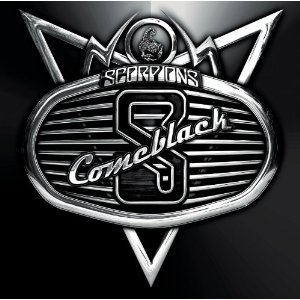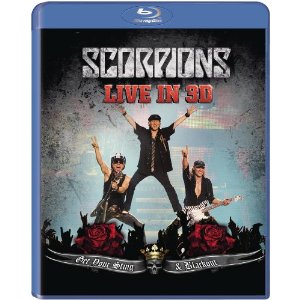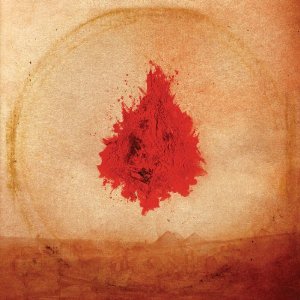Nanci Griffith Says "Hell No (I'm Not Alright)"
Nanci Grifith's new album Intersection (released on April 10) is her most personal to date, recorded at her house with loyal musical companions from over the years. Intersection's first single, "Hell No (I'm Not Alright)," is Nanci's ode to the Occupy movements, expressing the frustration felt over economics, politics as usual and beyond. The following is a premiere and exclusive presentation of the song's official video.

A Conversation with Scorpions' Klaus Meine
Mike Ragogna: Klaus, the latest Scorpions album, Comeblack, is supposed to be the band's last project. Really?
Klaus Meine: This is really our last album. I mean, what can I say? We announced that the last album we did was our last then went back into the studio last summer because our farewell tour was such a huge success. Sony Music said that they didn't want to let us go quite yet and they wanted to support the great tour we just had - so we went back to work in the studio. The idea was to pay tribute to some of those legendary bands that we listened to in the '60s before we started. It was a lot of fun to do material from the '60s. In fact, we have also re-recorded some Scorpions classics like "Rock You Like A Hurricane." We wanted to present some of those classics to the audience with the sounds of the 21st century - there's so much you can do in the studio these days that's different from the sound in the '80s. It was a lot of fun.
MR: Let's talk about one of the cover songs you recorded for Comeblack. Can you tell us about your take on T. Rex's "Children Of The Revolution"?
KM: Well, I don't know how big the song was in the U.S., but it was huge over here. I think the fact that it has such a strong riff was part of the reason people liked it in the first place and why we chose to do it. All of the songs we did, "Children Of The Revolution" is a classic composition that it would be impossible to top. The only thing we could do was try to put the Scorpions DNA on the cover and give it a try, really give it our best.

MR: Let's also talk about your 3D, 11 camera, concert film that you recently recorded called Get Your Sting And Blackout.
KM: Well, our guitar player Rudolf Schenker has been saying for years that we needed to shoot something in 3D, but it's not as easy as it sounds. You have to have the right director and the right 3D technology. Last year, we met with the director and he assured us that he had the newest 3D technology. We were already doing a Farewell Tour show in the southwest of Germany, so he came and filmed it in 3D. I tell you, the result is mind blowing. When you watch it, it's like the Scorpions are performing in your living room. You can feel the smoke when we play "Blackout," or you really see the mic coming towards you when I reach it into the audience for you to sing along. It's like you have the best seat in the house. You can't get any closer unless you were under my skin. (laughs)
MR: (laughs) What bonus material can people expect?
KM: Well, you will get to see the making of our 3D concert. We filmed a lot of the meetings and preparation for this show and that's all included in the box set. I think it's also important to let people know that you can also watch the 2D version of the concert included in the box set as well.
MR: Klaus, do you have a 3D set up at home?
KM: It's funny you ask. I was considering buying one recently because I wanted to watch our Blu-ray. I wasn't sure if I could watch in 3D on my television. All of a sudden, one day, there was a man with a huge package at the door. Rudolf sent me a 3D television as a very nice birthday present. (laughs)
MR: And what was the first movie that you watched in 3D?
KM: I believe it was Avatar. It was really breathtaking. And don't forget that not only is the movie in 3D, but it was also recorded in 5.1 surround sound, so the sound is really powerful as well.
MR: With so many years of Scorpions music under your belt, what would you say is your favorite song to perform?
KM: We get asked this question a lot, and I prefer to pick three songs - "Still Loving You" for love, "Wind Of Change" for peace, and "Rock You Like A Hurricane" for sex. (laughs) I mean, with a song like, "Still Loving You," we could be held responsible for the rise in the population in France in the '80s. (laughs)
MR: (laughs) When the band first formed, what influenced Scorpions' musical style?
KM: I think there were lots of things that contributed to that. We were inspired by a lot of bands like The Beatles, The Rolling Stones and The Who, all of those great bands that were a part of the "British Invasion" that came all over the world in the '60s. Of course, Led Zeppelin was also a huge inspiration. Actually, we tried some Led Zeppelin material for the Comeblack album, but there wasn't a song that we really wanted to touch because that's one of our all-time favorite bands. They had the perfect combination between "Whole Lotta Love" and "Stairway To Heaven," you know? They have a hard rock and heavy feel, while at the same time, seeming ballad-esque. We were thinking about trying to do, "Good Times Bad Times," but in the end, it didn't work out because I didn't want to try to sing like Robert Plant. I have far too much respect for those guys. So, those were the bands that really inspired us. We wanted to be a band that was melodic but had hard, hard riffs, like Led Zeppelin, but with the melody of The Beatles. I think when we met our producer Dieter Dierks back in the '70s and recorded our first album with him, he became important in helping us find our style.
MR: Do you have any advice for new artists?
KM: Believe in yourself, believe in your talent, and follow your dreams. The most important thing is to get out there and perform no matter how small the stage and the audience is. You have to go out and be on stage regardless so that you can actually figure out where you want to be, to see if you like being in front of an audience. Chemistry is also really important. Find some friends who are, hopefully, also talented musicians and get together and work with them. Then get on stage and play your music if you find that that's the place where you want to be.
MR: Klaus, for many, it will be very sad to see the Scorpions out on their last tour. How long will you be touring?
KM: I think we'll be going through the end of the year. We started the tour in March 2010, and we played the U.S that year, but we've decided to come back in June 2012. We'll be in the U.S. from early June through the end of July. We may even come back for a bit in October. So, it looks like we'll be all over the world for the rest of the year - North and South America, Canada, Asia, and, of course, all over Europe. We'll also be playing at the biggest metal festival in the world called the Wacken Open Air Festival. We played there in 2006 and now we'll be playing again in August. We'll be all over the place until the end of this year, and we're very excited about it. It's a celebration of 40 years of rocking. We're also doing a movie that's set to be released in 2017. We started shooting all over Europe last year. It's a very exciting project about this band and some younger kids that were trying to follow their dreams of making it in music out of Hanover, West Germany.
MR: Will that film be in 3D also?
KM: No. (laughs) That's a very complicated and very expensive setup. This is just a regular 2D film, but I think the material in the film is more important. This film takes the fans with us on this long journey and gives them a look behind the scenes. There will be tons of unseen footage and behind the scenes clips for the die-hard fans.
MR: Klaus, thank you so much for spending time with us today. And best of luck to you with your final album, your Farewell Tour, and the many other things you guys have going on right now.
KM: Thank you so much. Thanks for having me.
Comeblack Tracks:
1. Rhythm Of Love
2. No One Like You
3. The Zoo
4. Rock You Like A Hurricane
5. Blackout
6. Wind Of Change
7. Still Loving You
8. Tainted Love
9. Children Of The Revolution
10. Across The Universe
11. Tin Soldier
12. All Day And All Of The Night
13. Ruby Tuesday
Transcribed by Evan Martin

A Conversation with Adam Arcuragi
Mike Ragogna: Your music has been described as "Death Gospel." What do you think that means and is it the right description?
Adam Arcuragi: I think it is an appropriate label. Death Gospel is anything that sees the inevitability of death as a reason to celebrate all the special wonder that is being alive and sentient. That's the hope with the songs, and how we would like for them to come across, that thing in all life that is fine and good. It is exciting that we can reflect upon it as intelligent life and do something to make that wonder manifest. The Gospel aspect just is a nod to the groove that got imprinted on me as a child. That 2/2 is fun to work in and makes it easy to work up into that good place.
MR: Who would you consider your contemporaries?
AA: In my opinion, the great thing about music is that we're all joining in the tradition that is older than we can remember. We are all singing the same song, just in different ways. But if you're asking who's bringing that soul, who's making the longing call to arms, right now? Neko Case is a visage of the divine Moon. There is so much ecstatic fervor in her music. The Flaming Lips sing of that same Death Gospel joy-in-being. Even as far back as their album Hit to Death in the Future Head, they've been celebrating the great human power. Jeff Mangum's imagery is all very right on as well.
MR: What's your own musical evolution?
AA: The process is always growing and continually provides a challenge. Without a static point anywhere, there is always a change to carry you away - the chain is the fun part of the language aspect. But I like to think of it as continuing the endeavor right where the previous generations have left off. My aim is to continue in the traditions of Bill Withers, Brother Claude Ely, Robert Graves, Darlene Love and Sergei Rachmaninoff. Sergei and Ms. Love are actually references I used in getting the sounds on this album. I told Duane Lundy, our producer, that I wanted my guitar to sound like Darlene Love's voice and my voice to sound like Rachmaninoff's piano.
MR: You've worked with The Lupine Chorale Society, can you go into that?
AA: The name of the band comes from the title of the previous record. I've always preferred the idea of the piece of music sharing the top billing along side the group performing it. So the whole title was my attempt to make it about the album being performed by an ensemble rather than it being "the band's next record." The name just stuck and is now the banner under which the revolving cast fights.
MR: You grew up listening to your grandparents' old record collections. Which recordings most inspired you?
AA: There was something haunting about sound of the drums on old Glenn Miller 78rpm records. That was one of the first things on record that caught my attention. But there are so many records that I look to, in terms of their power in being close-to-perfect expression. If I had to pick a few that had the most palpable effect I'd have to say they'd have to be Blacklisted by Neko Case, +Justments by Bill Withers, The Goodbye Babylon Series, a field recording compilation out on the Dust To Digital label, Rachmaninoff Plays Rachmaninoff, the four known recordings of the maestro himself playing his own pieces, and New Morning by Bob Dylan.
MR: What's your process for creating music?
AA: Songs generally come out in two ways. The first comes as an idea of a chorus, melody or turn of phrase that I can work with and build from. The other is for a song to pop, fully formed, into my head and need light nips and tucks here and there. In terms of recording, I lean more toward the idea of taking an aural snapshot rather than painting layer by layer. It's that sound of frequencies mixing in the air that really grabs me. It was so much fun setting up the studio to facilitate the live playing of the ensemble. We took a whole day just to move around and see which instrument sounded best where. But once the microphones were placed and the room was set, we were able to focus a lot of energy on getting the performances to breathe and slip into that groove.
MR: Your new album is titled Like A Fire That Consumes All Before It... Before it what?
AA: The phrase is an ancient phrase that appears as being used to describe something that was "all consuming." The ellipses come from the Cy Twombly painting; that is how it is written on the canvas. But I guess Cy Twombly was perhaps making a play on the idea that the fire is both all consuming and perhaps in a state of conditional existence. But if that was not his intention, then I'll keep that with mine. Can you call "dibs" on a clever turn of phrase?
MR: What's the song on the new project that is the most personal to you and why?
AA: I'm supremely proud of the record as a whole. I feel like we got a lot of the old school 2/2 passion and a whole mess of slow-rolling, deep groove that comes from playing live. Lyrically though, I have a soft spot for "Oh I See," "You'd Think This Was Easy" and "Port Song." "Oh I See" is one of those songs that just flowed right through me, and "You'd Think This Was Easy" shaped the record early on. It was the molar unit we used to calibrate everything else by, and was also one of the first songs that came together in one go, on the first take.
MR: What Advice do you have for new artists?
AA: Listen. One of the finest skills a person can have is to be able to really listen. Even though the auditory impulses coming into your skull are involuntarily culled and sent to the brain, real listening is an inactive thing that you have to work hard on to become skilled in. An old jazz player told me once, "If you can't hear what I'm playing, then you are playing too loud." Draw people in by listening and being aware. The more people that are engaged, the greater the thing is that is greater than the sum of its parts.
